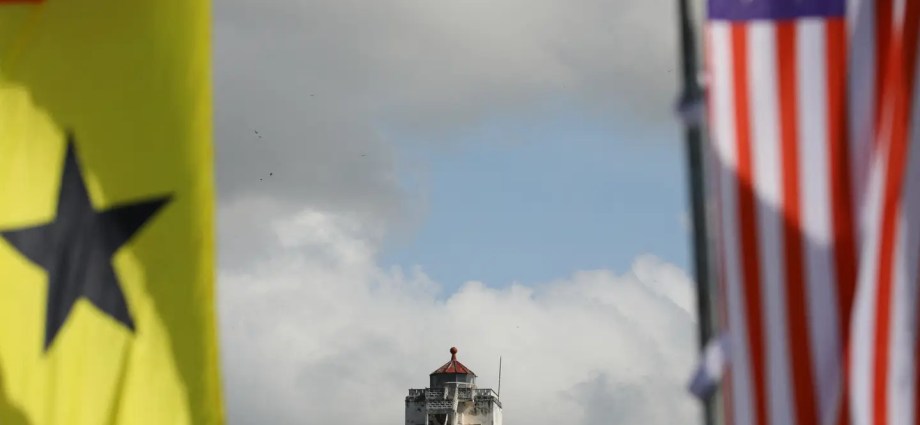Ghana Faces Legal Action Over US Migrant Deportations | International Relations & Human Rights Ghana Faces Legal Action Over Acceptance of US-Deported Migrants Ghanaian and American flags in Cape Coast, Ghana, on March 28, 2023. Credit: NIPAH DENNIS / AFP In a landmark legal challenge, Ghana has become the second African nation to face litigation for agreeing to host migrants deported from the United States. The case, filed on Wednesday, September 17, by a group of Ghanaian lawyers, accuses high-ranking state officials of unlawful detention and potential refoulement—a serious violation of international refugee law. The plaintiffs argue that Ghana’s acceptance of fourteen West African nationals, expelled by the U.S. in early September, constitutes a breach of both domestic and international human rights protocols. Named in the suit are Ghana’s Attorney General, the Chief of Defense Staff, and the Comptroller General of the Ghana Immigration Service. A Growing Trend: US Deportations to African Nations This is not an isolated incident. The United States has increasingly turned to African countries to accept migrants with whom they have little or no connection. Earlier this year, Eswatini (formerly Swaziland) found itself in a similar legal predicament. Other nations like South Sudan, Rwanda, and Uganda have also entered into controversial agreements with the U.S. to receive deportees. What makes Ghana’s case particularly significant is that it marks a shift in legal strategy. Until now, litigation had focused solely on the U.S. for its role in these deportations. This new lawsuit directly implicates Ghanaian authorities, suggesting a growing willingness among civil society to hold receiving countries accountable. Government Response: Deflection or Denial? Ghana’s Foreign Minister, Samuel Okudzeto Ablakwa, was quick to respond. In a statement released on Monday, he insisted that Ghana was not the target of the migrants’ grievances. “The real parties responsible are the United States and the Trump administration,” he asserted, distancing the Ghanaian government from allegations of rights violations. But legal experts aren’t so sure. “A receiving country has obligations under international law,” says human rights attorney Nana Ama Addo. “You can’t simply accept individuals removed from another state without ensuring their rights are protected. That includes protection against arbitrary detention and refoulement.” What Is Refoulement—And Why Does It Matter? Refoulement refers to the forced return of refugees or asylum seekers to a country where they are likely to face persecution, torture, or other serious harm. It is explicitly prohibited under the 1951 Refugee Convention and its 1967 Protocol, to which Ghana is a signatory. The plaintiffs in the current case argue that the deported individuals—all from West Africa—may be at risk if returned to their countries of origin. By detaining them on Ghanaian soil, the state may be complicit in setting the stage for their eventual refoulement. Broader Implications for US-Africa Relations The case also raises questions about the nature of diplomatic relations between the U.S. and African nations. Critics argue that agreements to accept deported migrants are often made under financial or political pressure, with little transparency or public debate. “This isn’t just about human rights—it’s about sovereignty,” says Kofi Mensah, a political analyst based in Accra. “When a government agrees to take in people who have no ties to the country, without due process or clear legal framework, it sets a dangerous precedent.” The U.S. State Department has not yet commented on the lawsuit, but the Biden administration has previously faced criticism for continuing certain Trump-era immigration policies, including third-country deportation agreements. Legal Precedents and Future Challenges This case could set an important legal precedent. If the High Court of Ghana rules in favor of the plaintiffs, it may encourage similar lawsuits in other African countries that have accepted U.S. deportees. It could also force a reevaluation of bilateral agreements between the U.S. and nations with limited capacity to process or protect asylum seekers. Moreover, the case highlights the role of local civil society in holding governments accountable. “This lawsuit was brought by Ghanaian lawyers, for Ghanaians, about Ghana’s legal responsibilities,” notes Addo. “That’s a powerful statement.” What’s Next for the Deported Migrants? As the legal process unfolds, the fourteen West Africans remain in detention in Ghana. Their fate—and the fate of future deportees—hangs in the balance. Human rights organizations are monitoring the situation closely, urging the Ghanaian government to ensure fair treatment and access to legal representation. “These individuals are not criminals,” says one local advocate. “They are people caught in a geopolitical game. They deserve dignity, due process, and protection—not indefinite detention in a country they never chose to come to.” A Test of Ghana’s Commitment to Human Rights Ghana has long been regarded as a stable democracy and a regional leader in human rights. How it handles this case will be closely watched—not just by its citizens, but by the international community. Will the courts uphold the rule of law and protect vulnerable migrants? Or will diplomatic and economic interests prevail? The answers to these questions will reveal much about the state of justice and governance in contemporary Africa. One thing is clear: the era of silent compliance may be coming to an end. As more countries are pushed into the spotlight for their role in U.S. deportation policies, legal challenges like this one are likely to multiply—and the conversation around migration, sovereignty, and human rights is only just beginning.
2025-09-18


